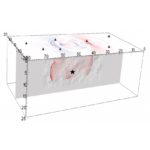A team from the Flatiron Institute is leveraging supercomputing resources from the Argonne Leadership Computing Facility to advance the design of peptides with the aim of speeding up the search for promising new drugs. “Existing peptide drugs rank among our best medicines, but almost all of them have been discovered in nature. They’re not something […]
Flatiron Institute Using Argonne HPC to Design Peptide-based Drugs with Quantum Mechanics
New York Power Authority Turn to ALCF’s Theta Supercomputer for Climate Change Planning
The largest state public power entity in the U.S., the New York Power Authority (NYPA), is addressing critical, long-term planning challenges by assessing how its ability to generate, transmit and deliver electricity may be affected by climate change. For the first time, NYPA is evaluating its comprehensive climate risk with the help of the U.S. Department […]
ALCF Developer Session: Inside the NVIDIA Ampere A100 GPU in ThetaGPU and Perlmutter
On Wednesday, July 28 at 11 am CT, the Argonne Leadership Computing Facility will present a developer session focused on utilization of the Nvidia Ampere A100 GPU in ALCF’s ThetaGPU and NERSC’s Perlmutter supercomputers. Registration is here. The Ampere A100 GPU builds on the performance of the NVIDIA V100 GPU and includes new features for […]
NERSC, ALCF, Codeplay Partner on SYCL GPU Compiler
The National Energy Research Scientific Computing Center (NERSC) at Lawrence Berkeley National Laboratory (LBNL) and Argonne Leadership Computing Facility (ALCF) are working with Codeplay Software to enhance the LLVM SYCL GPU compiler capabilities for Nvidia A100 GPUs. The collaboration is designed to help NERSC and ALCF users, along with the HPC community in general, produce […]
Summit and Theta Supercomputers Power ML Models for Fusion Energy Research
A team led by C.S. Chang at Princeton Plasma Physics Laboratory (PPPL) has used the Oak Ridge Leadership Computing Facility’s (OLCF’s) 200-petaflop Summit and Argonne Leadership Computing Facility’s (ALCF’s) 11.7-petaflop Theta supercomputers, together with a supervised machine learning program called Eureqa, to find….
Argonne Claims Largest Engine Flow Simulation Using Theta Supercomputer
Scientists at the U.S. Department of Energy’s (DOE) Argonne National Laboratory have conducted what they claim is the largest simulation of flow inside an internal combustion engine. Insights gained from the simulation – run on 51,328 cores of Argonne’s Theta supercomputer – could help auto manufacturers to design greener engines. A blog post on the […]
Supercomputing the San Andreas Fault with CyberShake
With help from DOE supercomputers, a USC-led team expands models of the fault system beneath its feet, aiming to predict its outbursts. For their 2020 INCITE work, SCEC scientists and programmers will have access to 500,000 node hours on Argonne’s Theta supercomputer, delivering as much as 11.69 petaflops. “The team is using Theta “mostly for dynamic earthquake ruptures,” Goulet says. “That is using physics-based models to simulate and understand details of the earthquake as it ruptures along a fault, including how the rupture speed and the stress along the fault plane changes.”
Video: Profiling Python Workloads with Intel VTune Amplifier
Paulius Velesko from Intel gave this talk at the ALCF Many-Core Developer Sessions. “This talk covers efficient profiling techniques that can help to dramatically improve the performance of code by identifying CPU and memory bottlenecks. Efficient profiling techniques can help dramatically improve the performance of code by identifying CPU and memory bottlenecks. We will demonstrate how to profile a Python application using Intel VTune Amplifier, a full-featured profiling tool.”
Theta and the Future of Accelerator Programming at Argonne
Scott Parker from Argonne gave this talk at ATPESC 2019. “Designed in collaboration with Intel and Cray, Theta is a 6.92-petaflops (Linpack) supercomputer based on the second-generation Intel Xeon Phi processor and Cray’s high-performance computing software stack. Capable of nearly 10 quadrillion calculations per second, Theta enables researchers to break new ground in scientific investigations that range from modeling the inner workings of the brain to developing new materials for renewable energy applications.”
Argonne-led team wins SCinet Technology Challenge at SC19
An extensive collaboration led by Argonne won the Inaugural SCinet Technology Challenge at the SC19 conference by demonstrating real-time analysis of light source data from Argonne’s APS to the ALCF. “Accelerator-based light sources — large-scale instruments used to investigate the fundamental properties of matter — generate large amounts of data that require computational analysis. The Argonne team won by designing an innovative method to support such investigations.”












